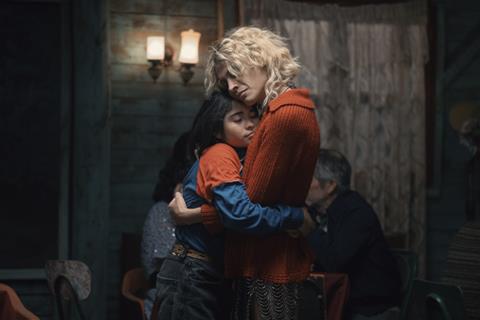AIDS is making its presence felt within an alternative community in the mining region

Dir/scr: Diego Cespedes. Chile/France/Germany/Spain/Belgium. 2025. 110 mins
Love is a constant saving grace in The Mysterious Gaze Of The Flamingo. Diego Cespedes’s striking debut feature blends together a heady mixture of melodrama, western and coming of age tale to create an imaginative, indignant AIDS-era story. The Un Certain Regard Jury Prize should help confirm its arthouse potential among audiences in search of the offbeat and heartfelt.
Cespedes just about maintains control of the sprawling narrative
Cespedes won the Cinefondation First Prize at Cannes for his first short The Summer Of The Electric Lion (2018). His debut feature is set in a remote mining community in northern Chile in 1982. The dusty lunar landscapes, harsh blue skies and vibrant score (complete with Morricone-like whistles) all combine to suggest the setting for a spaghetti western. Eleven year-old Lidia (Tamara Cortes) lives here in the warm embrace of her alternative, queer family. Home is a shack-cum-cantina where the miners come at night to take their pleasure with a community of transvestites, presided over by Mama Boa (Paula Dinamarca) and including Flamingo (Matias Catalan), a mother figure to Lidia.
A new plague in the community has created a climate of fear. The wildest rumours suggest it can be transmitted by a simple look between two men who are in love. The miners do everything they can to avert their eyes as the transvestites pass them by. When Lidia is bullied by some of the local boys, Flamingo and the others respond by forcing them to look into their eyes. It is a comical punishment but also a way of asserting their presence. There is no irony lost in the way that the response to blind prejudice is to literally open their eyes,
Flamingo and the other girls see it as their job to inject some glamour into the community. Their cantina is a place to leave your cares behind. A Miss Alaska Pageant allows the girls to parade, dance and lip-synch to the most soulful of songs. Heartache and hope are constant companions in a community where a wedding, a dance, a hug and various acts of friendship help to confront prejudices, death and the desire for vengeance.
Some find it hard to distinguish between fantasy and reality, including the feverish miner Yovani (Pedro Munoz) who pines for lost love Flamingo. His actions force Lidia to grow up faster and find her place in a confusing world. Her loyal friend Julio (Vicente Caballero) helps her negotiate this tumultuous time of love and death, loss and exile.
There are a lot of influences at play in The Mysterious Gaze. from Pedro Almodovar to telenovela and also Margaret Attwood’s ’The Handmaid’s Tale’ once the girls are blindfolded, restricted in their movements and placed under the control of the older miners. Additional elements of magic realism and fantasy can make it feel as if there is a little too much going on. Cespedes just about maintains control of the sprawling narrative, investing it with dry humour and finding a wistful melancholy in the moments when key characters are able to count their blessings. A strong ensemble cast includes notable work from Matias Catalan as the romantic Flamingo and Paula Dinamarca as the fierce, protective Mama Boa. Tamara Cortes is a great find as Lidia, investing her with a sharp intelligence and the watchful eyes of someone well aware of everything that is going on around her.
Ultimately, Cespedes has created a touching reflection of past times but one that also resonates in a present where prejudice and ignorance are never far away.
Production companies: Quijote Films, Les Valseurs
International sales: Charades. carole@charades.eu
Producers: Giancarlo Nasi, Justin Pechberty, Damien Megherbi
Cinematography: Angello Faccini
Production design: Bernardita Baeza
Editing: Martial Salamon
Music: Florencia Di Concillio
Main cast: Tamara Cortes, Matias Catalan, Paula Dinamarca, Pedro Munoz
























